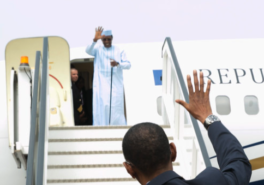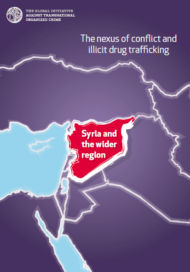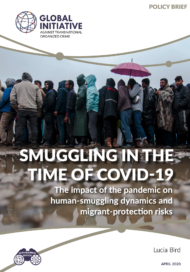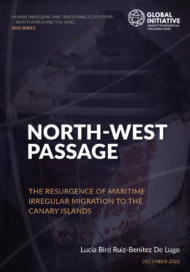Posted on 31 Aug 2020
Despite the upheaval in Bamako, the patronage networks and socio-political systems that enable illicit economies to thrive in Mali – such as drug trafficking, migrant smuggling and arms trafficking – are likely to remain intact.
On 18 August, Malian military officers arrested the country’s President, Ibrahim Boubacar Keïta, and several other high-ranking officials. Hours later, a detained Keïta dissolved the Malian government and announced his resignation.
Amid this uncertainty, there is a utility in assessing the impact of the coup on the Mali’s criminal economies. These economies matter because they are a significant, and often under-appreciated component of formal and informal political and security structures, in turn influencing patterns of fragility and violence in Mali.
Changing the Guard
After securing Keïta’s resignation, the officers took to national TV to introduce themselves as the National Committee for the Salvation of the People (CNSP), stating that the CNSP would ‘organize general elections to allow Mali to equip itself with strong institutions within a reasonable time limit’ and help create a ‘political transition leading to credible elections for the exercise of democracy through a roadmap that will lay the foundations for a new Mali’.
Leaders of the Movement of 5 June – Rally of Patriotic Forces, an opposition-led protest movement that for weeks had been calling for Keïta’s removal from office, responded positively to the coup. On 21 August, the movement held a large rally to celebrate Keïta’s departure, headlined by the CNSP and Imam Mahmoud Dicko, an influential religious leader and one of the deposed president’s fiercest critics. It is unclear, however, whether the political opposition, Mali’s religious elites, and the military have a shared vision for the future of the country, and the whether the current bonhomie will be sustained.
The response by the international community has been decidedly less sanguine. France, the United States and the European Union – security partners with considerable military assets in the region – have called for a restoration of constitutional order as soon as a possible. All three saw Keïta as a crucial, if frustrating, partner in their military campaigns against jihadist insurgents allied with al-Qaeda and the Islamic State, groups which have expanded their presence in Mali and neighbouring countries in recent years. For Mali’s partners, Keïta’s departure brings unwelcome uncertainty at a time when their counterterrorism and peacekeeping missions in the country face steep challenges.
For its part, the Economic Community of West African States (ECOWAS) has responded with its typically hard-line response to coups among its member states, closing its member states’ borders with Mali and vowing to impose sanctions on ‘all the putschists and their partners and collaborators’. West African heads of state are loath to endorse military takeovers given that many of the dynamics at play in Mali, such as frustrated publics and disgruntled militaries, are present in their own countries. Thus far, negotiations between ECOWAS and the CNSP over a timetable for the return to civilian rule have gone nowhere.
Another coup, but what change?
This is the second time in eight years that Mali’s military has removed a president who (at least in the eyes of international observers) had been democratically elected, but the context this time round is very different. Before the 2012 coup, Mali was a darling of the international donor community and portrayed as a democratic model for the region. This time, Mali enters a new phase of political uncertainty with the country overwhelmed by multiple crises. A full-blown insurgency rages across the country’s northern and central regions, with local populations finding themselves targeted by jihadist gunmen, so-called ‘self-defence’ militias and the Malian armed forces.
There are also important differences in how the two coups were carried out. The coup in 2012 was a haphazard, violent and highly disruptive endeavour undertaken by junior officers. By contrast, the 18 August coup was a bloodless overthrow of a deeply unpopular president spearheaded by battle-hardened, mid-ranking officers. Thus far, the CNSP has signaled that it does not intend to alter, at least in the short term, the foundations of Mali’s political system beyond the removal of Keïta and key political and military figures around him.
Dynamics on the ground can change quickly, but it appears that the junta is calling for a reset, not a revolution. The coup leaders have claimed, for example, that they are committed to the international military and peacekeeping deployments in Mali, such as France’s Operation Barkhane, the United Nations mission in Mali (MINUSMA), the G5 Sahel force (led by regional militaries) and the Takuba Task Force (led by European militaries). The CNSP has also stated its intention to support the ongoing implementation of the peace process linked to the 2015 Algiers Agreement, which was signed by the government and various former rebels based in northern Mali.
The two main coalitions of armed groups involved in the Algiers Agreement – the Coordination of Azawad Movements (CMA) and the Plateforme – are monitoring events closely, but show little apparent interest in challenging the status quo. Two days after the coup, representatives from both coalitions gathered in Takelot to review security dynamics. GI-TOC contacts report that both are concerned about the state of politics in Bamako but evince a willingness to move forward with the CNSP with regards to the peace process.
Illicit economies likely unaffected
The impact of the coup on the country’s illicit economies is unlikely to be significant, with most continuing to function largely unimpeded. In part, this is due to the CNSP’s commitment to existing frameworks combined with armed groups’ de facto control over parts of northern Mali containing important trafficking routes. However, this continuation is also enabled by the political connectivity and resilience of Malian criminal networks.
Criminal networks are deeply embedded within Mali’s formal and informal political and security structures, leveraging patronage networks and corruption to accomplish their goals and ensure impunity. While this status quo predated his presidency, Keïta oversaw a government that was deeply corrupt and maintained, rather than limited, links to actors engaged in illicit economies.
One high-level official arrested by the CNSP shortly after the coup was General Moussa Diawara, who led Mali’s main intelligence directorate. According to a United Nations Security Council report, Diawara provided protection and promises of impunity to traffickers from the Lamhar Arab community in exchange for payments from Mohamed Ould Mataly, a representative in Mali’s national assembly. Ould Mataly has long been tied to drug trafficking, including via his son-in-law, Mohamed Ben Ahmed Mahri, one of the most well-known drug traffickers in the Sahel.
It is unclear what other arrests or resignations will follow in the coming weeks. However, there is little indication that these arrests or Keïta’s removal from power will diminish the role and power of patronage networks within Mali’s political and security establishment, nor impact criminal networks’ exploitation of them.
Those engaged in illicit economies have also proven themselves to be agile in adapting to new conditions and shifts in power in Mali. In 2012, for example, the coup and jihadist takeover of large swathes of northern Mali disrupted long-established connections between state officials and drug traffickers. Yet these networks proved remarkably resilient, quickly forming new alliances to ensure that their illicit activities could continue. Even after a French-led military intervention drove jihadist groups out of northern Mali, trafficking networks readily readjusted to new realities on the ground.
In many instances, this involved criminal actors inserting themselves within the peace process via the CMA and the Plateforme, who de facto regulate many of the areas outside of state control in northern Mali through informal systems of patronage and protection. While neither the CMA nor the Plateforme is necessarily involved in drug trafficking at an organizational level, individual members are involved in trafficking, while the taxation or protection of drug shipments is widespread. Such arrangements provide a degree of stability that allows criminal actors to carry out a range of illicit activities, including smuggling everything from drugs to people and gold.
As a result, criminal networks are more likely to be disrupted by how armed groups in the north respond to events in Bamako rather than by what actually transpires in Bamako. This is particularly true for those illicit economies which do not have much interaction with Mali’s formal political or security structures. Cannabis resin produced in northern Morocco and trafficked through northern Mali, for example, has very little interaction with Malian state actors. In this trade, the functional control of northern Mali by armed groups and the long-term absence of the state means that, according to a GI-TOC contact, ‘the coup has no impact on [traffickers’] business’.
Other illicit economies in the north are similarly less likely to see an impact from the coup due to the generally limited intersection with formal government actors. Migrant smugglers, for example, are far more dependent on Algeria’s policies at Mali’s northern border than they are on political perturbations in Bamako.
Ultimately, neither government officials, armed-group members nor prominent traffickers have an interest in harming business by dismantling existing patronage structures. If the CNSP’s coup does indeed represent a reset rather than a revolution, than there is little reason to believe that illicit economies, including those that require high-level state complicity, will not be able to carry on their activities with minimal disruption.
While Mali’s criminal economy is unlikely to be heavily impacted by the coup, criminal networks could well influence what comes next. It is unclear what government-forming processes will take place in Bamako in the coming weeks and months, but new alliances are likely to be formed by a range of actors, including those involved in criminal activity. These revised power and patronage connections will likely shape governance, but in ways that often hard to pinpoint because they are rarely the sole driver of individual decisions or outcomes. One armed-group member in northern Mali told the GI-TOC: ‘This is a probably the beginning of new relationships between traffickers and the future security and political elite.’
For the international community, there is a critical need to better understand the ways in which criminal economies shape formal and informal political, economic and security structures in Mali. Drug traffickers and contrebandiers are not the key drivers of conflict in Mali, although they are often construed as such. However, their activities do have an impact on stability and fragility through degrading the state, sparking tensions between armed groups and frustrating citizens.
Ultimately, Malian citizens will be the long-term losers from the continuation of the current political status quo, which is influenced and sustained in part by criminal networks. Only after strategic political reform and broad-based economic change are developed can illicit markets in Mali be effectively tackled.



